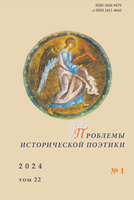Мифология и поэтика социалистического реализма
Mythology and Poetics of Socialist Realism
Author(s): Dmitry Bogatyrev, Aleksey V. SvyatoslavskiySubject(s): Cultural history, Aesthetics, Social history, Russian Literature, Theory of Literature, Sociology of Literature
Published by: Петрозаводский государственный университет
Keywords: poetics; mythology; Soviet literature; socialist realism; critical realism; romanticism; classicism; pathos; creative method; positive hero; negative hero;
Summary/Abstract: The purpose of the study is to identify the artistic features of socialist realism as a cultural phenomenon. The article examines the history of the emergence of the term and the concept behind it in connection with the sociopolitical situation in the USSR at the turn of the 1920s — 1930s. The definition of socialist realism, enshrined in the Charter of the Union of Soviet Writers, as “a truthful, historically concrete depiction of reality in its revolutionary development” in combination with “the task of ideological alteration and education of workers in the spirit of socialism,” is critically assessed. In the work, socialist realism is presented as a method, style, literary and artistic direction; this is done in order to understand to what extent it was a phenomenon of artistic culture, and to what extent it was a propaganda ideologeme. The features of pathos, typology of heroes, and the presence of a number of regulatory principles in the poetics of socialist realism are analyzed. It is shown that socialist realism has become an important tool for the formation of the socialist mythology. The theoretical aspect of socialist realism turned out to be in many ways an attempt to synthesize a number of features inherent in realism, romanticism and classicism, and from the point of view of historical and cultural, it was an attempt to implement in artistic creativity (primarily in the content of works) an ideologeme arising from the so-called triune task of building communism, which assumed, in particular, raising human beings of a new type. The article considers a wide range of opinions on the essence of socialist realism and realism as such, expressed in the materials of the Soviet period (M. Gorky, I. V. Stalin, I. M. Gronsky, N. I. Bukharin, A. I. Ovcharenko, A. D. Sinyavsky, V. V. Kozhinov, V. N. Turbin) and in the works of modern researchers in Russia and abroad (A. Y. Ovcharenko, Yevg. Dobrenko, L. A. Spiridonova, B. M. Gasparov, H. Gunther, K. Clark, et al.). The authors of the article come to the conclusion that it is possible to single out a special socialist realist trend and stage within the framework of the Soviet period of Russian literature as an expression of a cultural and ideological paradigm, while not finding anything specific in the poetics of socialist realism that would radically distinguish it from the poetics of realism and romanticism. The concept of critical realism, which was used by the theorists of socialist realism to justify a new method based on the principle of the opposite, is seen today as redundant from the point of view of literary theory.
Journal: Проблемы исторической поэтики
- Issue Year: 22/2024
- Issue No: 1
- Page Range: 250-272
- Page Count: 23
- Language: Russian

